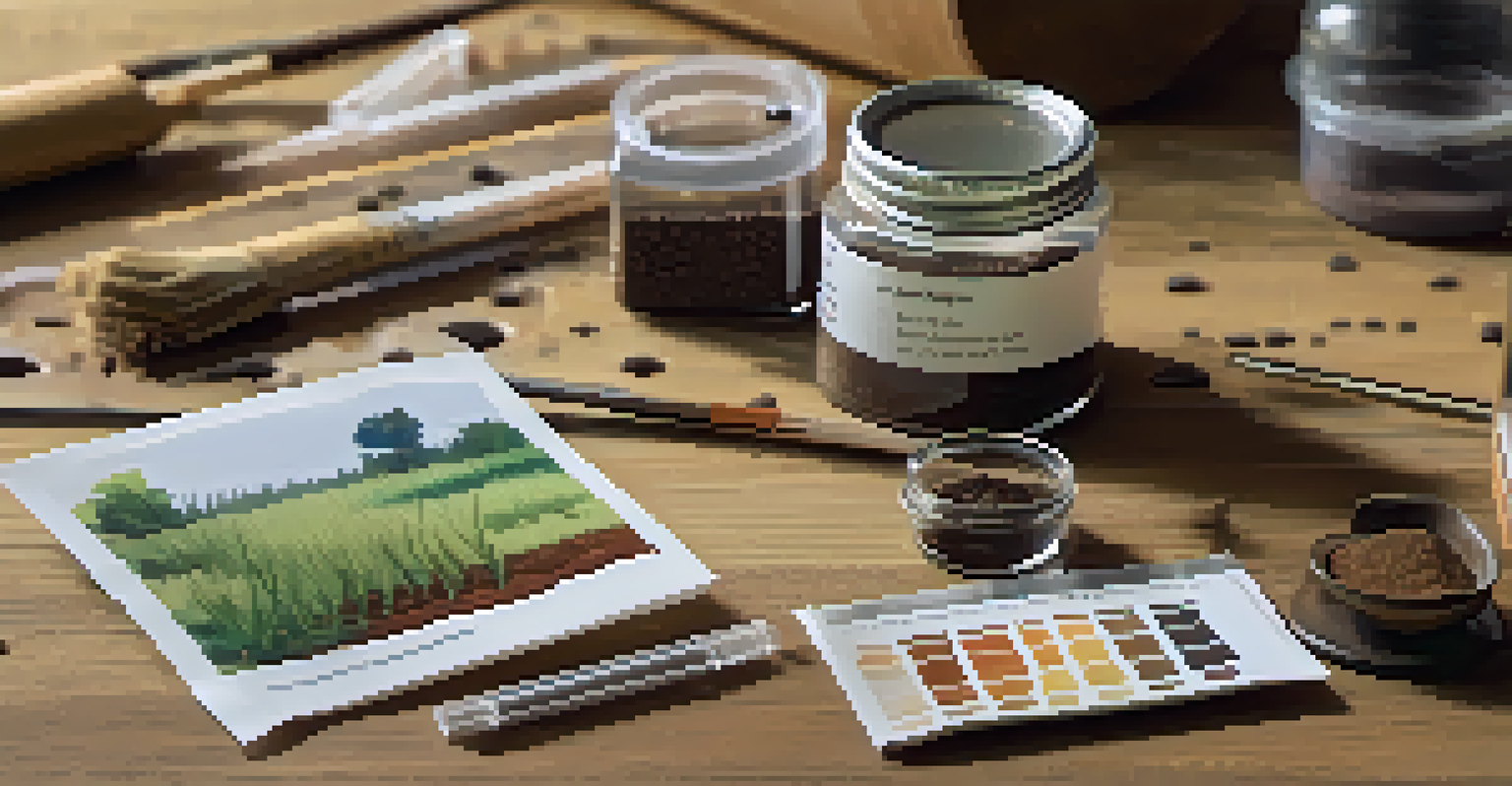How to Create a Healthy Organic Garden Soil Composition

Understanding the Importance of Soil Composition
Soil is often referred to as the foundation of any garden, and for good reason. The right soil composition provides essential nutrients that plants need to grow strong and healthy. Without adequate soil health, even the most beautiful plants may struggle to thrive, making it essential to understand how to create a balanced mix.
The health of soil, plant, animal, and man is one and indivisible.
Imagine your garden as a cake: if the ingredients are off, the end result won’t be delicious. Similarly, the right balance of organic matter, minerals, and microorganisms in your soil can make all the difference for your plants. Healthy soil supports root growth, water retention, and nutrient availability.
By investing time into understanding soil composition, you set the stage for a vibrant garden. It’s not just about planting seeds; it’s about creating an environment where those seeds can flourish.
Key Components of Organic Soil
To create a healthy organic garden soil, it’s essential to know its key components. The primary ingredients include organic matter, minerals, water, and air. Each of these plays a critical role in ensuring that your garden soil is not only fertile but also capable of supporting plant life.

Organic matter, like compost or well-rotted manure, enriches the soil and helps retain moisture. On the other hand, minerals such as sand, silt, and clay contribute to the soil structure, influencing drainage and aeration. Balancing these components is crucial for fostering a thriving garden.
Soil Composition is Crucial
Understanding soil composition is essential for creating a thriving garden environment that supports plant growth.
Think of these components as a team working together: organic matter nourishes the soil, while minerals provide structure, allowing plants to access water and nutrients efficiently. A harmonious blend of these elements will create a solid foundation for your garden.
Testing Your Soil for Nutrient Levels
Before diving into amendments, testing your soil is a wise first step. Soil tests can reveal nutrient deficiencies, pH levels, and organic matter content, providing a roadmap for what your soil needs. Many garden centers offer testing kits or services to help you get accurate results.
Healthy soil is the foundation of healthy food, and healthy food is the foundation of healthy people.
For example, if your soil test reveals low nitrogen levels, you might consider adding organic fertilizers like blood meal or composted manure. Conversely, if your soil is too acidic, lime could be a great addition to balance the pH. Understanding these factors allows you to tailor your soil composition effectively.
By regularly testing your soil, you can ensure that it remains healthy and balanced over time. Just like regular check-ups at the doctor, keeping an eye on your soil health can lead to better garden outcomes.
Incorporating Organic Matter into Your Soil
Organic matter is the lifeblood of healthy garden soil, and incorporating it is a game-changer. This can include compost, leaf mold, or even kitchen scraps that break down into rich, nutrient-dense material. By adding organic matter, you not only enhance nutrient availability but also improve soil structure.
Imagine planting in a spongy, rich cake instead of hard concrete; your plants will have a much easier time growing strong roots. Organic matter helps with moisture retention and promotes beneficial microbial activity, which is vital for plant health.
Organic Matter Enhances Soil Health
Incorporating organic matter like compost enriches soil, improves structure, and promotes beneficial microbial activity.
Aim to add organic matter to your garden soil at least once a year, especially in the spring before planting. This practice will keep your soil vibrant and alive, creating a thriving ecosystem for your plants.
Balancing Soil pH for Optimal Plant Growth
Soil pH is a crucial factor that can affect nutrient availability and overall plant health. Most plants prefer a slightly acidic to neutral pH, around 6.0 to 7.0. If your soil test indicates that the pH is outside this range, you may need to adjust it for optimal growth.
For example, if your soil is too acidic, adding lime can help raise the pH, while sulfur can lower it if the soil is too alkaline. Think of pH as the gatekeeper to nutrients; if it's not in balance, your plants may struggle to absorb what they need.
Regularly monitoring and adjusting your soil pH will help create a welcoming environment for your plants. Just like a well-tuned instrument, balanced soil will lead to a more harmonious garden.
Utilizing Cover Crops for Soil Health
Cover crops are like a protective blanket for your soil, offering numerous benefits when planted during the off-season. These crops, such as clover or vetch, help prevent erosion, suppress weeds, and add organic matter back into the soil when turned under. They work hard even when you’re not actively planting, making them a smart choice for any gardener.
By using cover crops, you can also fix nitrogen in the soil, which is essential for healthy plant growth. It’s like having a team of helpers preparing your garden for the next planting season, ensuring that your soil is rich and nutrient-dense.
Microorganisms Support Plants
Microorganisms play a vital role in nutrient cycling and plant health, making a diverse microbial community essential for gardening success.
Incorporating cover crops into your gardening routine is a simple yet effective strategy. They not only enhance soil health but also contribute to a sustainable gardening practice.
The Role of Microorganisms in Soil Health
While they may be invisible to the naked eye, microorganisms play a tremendous role in maintaining soil health. These tiny creatures, including bacteria and fungi, break down organic matter, recycle nutrients, and help plants absorb water. The more diverse your soil’s microbial community, the healthier your garden will be.
Consider microorganisms as the unsung heroes of your garden; they work tirelessly to create a thriving ecosystem. By enhancing soil health, these microbes improve plant growth and resilience against pests and diseases.

To foster a healthy microbial community, avoid using chemical fertilizers and pesticides that can harm these beneficial organisms. Instead, focus on building a rich, organic environment where they can thrive and support your plants.